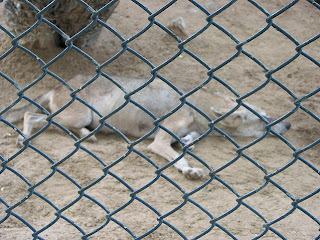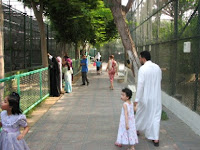28.02.2012 - This weekend, the inaugural Persian International Film Festival took place in Sydney, Australia, creating a unique local showcase for films from Iran, Dubai, Afghanistan and Tajikistan – nations that share the same Persian language, history and heritage. The four-day event brought large audiences from the local Persian communities as well as fans of world cinema to the Dendy Opera Quays theater, next door to the Sydney Opera House; and created a buzz on Sydney’s busy summer calendar with an appealing and thought-provoking program.
Please Don’t Disturb (2011), written and directed by Mohsen Abdolvahab, won the festival’s award for best feature at the closing ceremony on Sunday. Abdolvahab’s film, which also won a screenplay award at the Dubai International Film Festival, weaves together three stories set in contemporary Tehran, depicting the lives of a battered wife, a mullah and an elderly couple. The award for best short film went to The Silly.
PFF founders and co-directors Amin Palangi and Sanaz Fotouhi opened the festival on Thursday night after a welcoming party featuring Persian food and dancers in traditional dress. They described the event to attendees as a grassroots family affair (the two happen to be married, and relied on support from family members both in Australia and Iran) and touched on their vision of encouraging the exploration of Persian culture through film. Palangi admitted to being originally inspired by the success of Asghar Farhadi’s A Separation, the festival’s closing night film. “When A Separation won the top prize at the Sydney Film Festival in June, I suddenly felt that there was a festival missing in Sydney.” He decided then and there to throw his efforts into showcasing on the silver screen a range of cultures often absent from the Australian media.
“We hope that this festival will offer a way of bridging cultural differences between people,” Fotouhi said afterwards. “What this means is that we wanted to cross cultural diversities and highlight common human traits, and film, because of its visual medium, is one of the best ways to do this.” Palangi and Fotouhi are both doctoral candidates studying film and diasporic Persian literature respectively, and both have also produced films in Iran as well as Afghanistan.
The PFF’s inaugural program was modest but strong. The opening night film was Iran/UK co-production I Am Nasrine (Tina Gharavi, 2011), a rough-hewn but bold drama about a teenager and her brother who are forced by their parents to emigrate to England after she is arrested on morality charges in Tehran. That film’s themes of migration, families torn apart, youthful angst and star-crossed love resonate throughout the program in works that comment on the social turmoil, war and poverty that plague the region.
The competition also included noteworthy older films such as Heiran (Shalize Arefpour, 2009), a touching and expertly crafted social-realist drama about a teenaged country girl who runs away from home to marry an Afghani immigrant; and Ashkan, the Charmed Ring and Other Stories, which brought Shahram Mokri the best director prize at the 2009 Tehran Film Festival. Rainy Seasons (Majid Barzegar, 2010) is a portrait of an Iranian teenager suffering from his parents’ divorce.
An interesting exception to the festival’s trend of social and family dramas was Opium War (2008), a black comedy from Afghani director Siddiq Barmak about two American soldiers lost in enemy territory in Afghanistan; it won best feature at the Rome Film Festival.
The festival also boasted a substantial program of short films, including Bitter Milk (Nasser Zamiri, 2011), a harrowing account of baby smuggling along Afghanistan’s border with Pakistan which won a number of prizes at regional festivals; Going (Salem Salavati, 2011), a tense drama about Kurdish refugees trying to escape Iran; and Delete (Kazem Mollaie, 2011) A comedy about digital photo manipulation featuring unique graphic art that won best film at the Tehran Short Film Festival.
“We wanted to represent a diverse range of films from established filmmakers as well as emerging ones says Fotouhi.The festival is representative of a range of voices. It is not only about a unique voices, rather it is about the multiplicities of voices that are emerging from the region and from their overseas communities.
No films from Tajikistan were included in the inaugural festival; but Palangi has stated that he is eager to see Tajik cinema included in future editions.
In addition to the awards ceremony, the closing night of the festival featured an out-of-competition screening of A Separation, the widely acclaimed drama that won a Special Jury Prize at last year’s ADFF among many other accolades on its way to winning the Academy Award for Best Foreign Language Film. Director Farhadi was originally scheduled to attend the sold-out screening, but was ultimately unable to because the Oscars took place in Los Angeles the following day.
Sunday’s sessions also included a panel discussion about Iranian cinema and a screening of a short documentary about the making of A Separation. The PFF’s tribute to Farhadi will continue with monthly screenings of his earlier work – including the haunting About Elly, which screened at ADFF in 2009. A Separation will be released in Australia on March 1, following highly lucrative runs in Iran, Europe and North America.


















































